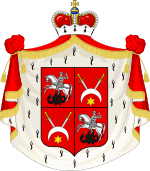Czetwertyński family
| Sviatopolk-Chetvertynsky / Czetwertyński | |
|---|---|
|
Family coat of arms | |
| Ethnicity | Ruthenian |
| Current region | Poland, Canada, Belgium |
| Place of origin | Chetvertnia, Lutsk county, Volhynia |
Czetwertyński or Chetvertynsky (also Sviatopolk-Chetvertynsky) is a Ukrainian[1] (or Polish) princely family originated from Volhynia in the Crown of the Kingdom of Poland.[2] The family takes its name from the village of Chetvertnya, Lutsk county, in modern-day Manevychi Raion, Volyn Oblast. The family traditionally claims to be one of the surviving branches of the Rurik dynasty, although this claim was recently undermined by DNA tests.[3]
History
According to family's legend, the progenitor of it is the Grand Prince of Kiev Sviatopolk II.[2] The first documented member of the family is Oleksander Chetvertynsky who is mentioned in 1388.[1]
In 1492 Prince Fedir Mykhailovych Chetvertynsky was the Lithuanian-Ruthenian ambassador to Wallachia.[1] Over time some members of the family were Catholicized, but mostly the family remained adherent to the Eastern Orthodox religion.[1]
Prince Stepan Sviatopolk-Chetvertynsky (1575-1659) played a key role in reestablishing the Ukrainian Orthodox Church of the Ecumenical Patriarchate of Constantinople in 1620.[1] His son Mykola Sviatopolk-Chetvertynsky (?-1659) was a relative of the Hetman of Zaporizhian Host Ivan Vyhovsky.[1]
Two of the most notable representatives of the family were Hedeon Zakharovych Svyatopolk-Chetvertynsky, the Metropolitan of Kiev, Galicia and all Little Russia in 1685-90,[1] and Antoni Stanislaw's daughter Marie who was Alexander I of Russia's mistress and had children by him. Nephew of Hedeon, Yurii Sviatopolk-Chetvertynsky (?-ca 1717–22) was a son-in-law of the Hetman of Zaporizhian Host Ivan Samoylovych.[1]
After Antoni Stanisław Czetwertyński-Światopełk was lynched in 1794 by Polish nationals in Warsaw (Russian Empire) during the Kościuszko Uprising,[4] his family resettled in Saint Petersburg. It received major land grants from Catherine the Great such as the manor of Filimonki near Moscow.
Coat of Arms
The family used the Pogoń Ruska Coat of Arms.
-
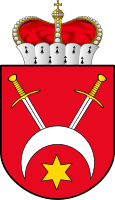
Smaller coat of arms of the Czetwertyński family used in the 16th century.
-
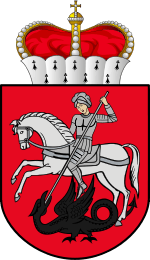
Pogoń Ruska
Notable members
Palaces
-
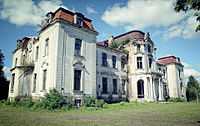
Palace in Żołudek
-
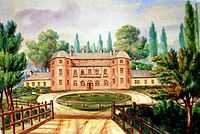
Czetwertyńsk Palace in Grodno
-
.jpg)
Uruski Palace in Warsaw, inherited from Countess Maria Uruska herbu Sas in 1931, youngest issue of Count Seweryn Uruski herbu Sas (1817–1890). The palace now forms the University of Warsaw.
External links
References
- ↑ 1.0 1.1 1.2 1.3 1.4 1.5 1.6 1.7 Sviatopolk-Chetvertynsky at the Encyclopedia of Ukraine
- ↑ 2.0 2.1 http://www.britannica.com/search?query=czetwerty%C5%84ski
- ↑ http://www.familytreedna.com/public/rurikid/default.aspx?section=news
- ↑ Kronika powstań polskich 1794–1944, Wydawnictwo Kronika, Warszawa, ISBN 83-86079-02-9, s. 38
Template:Belarus-noble-stub
